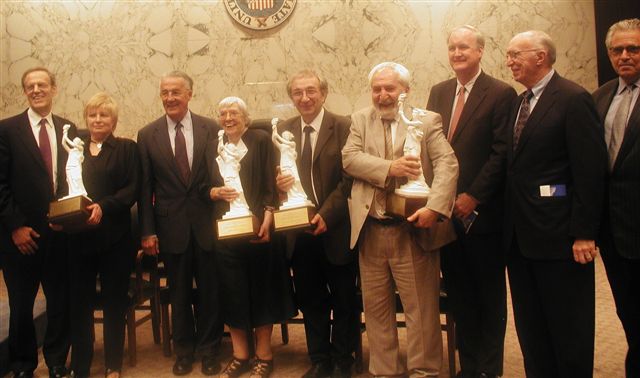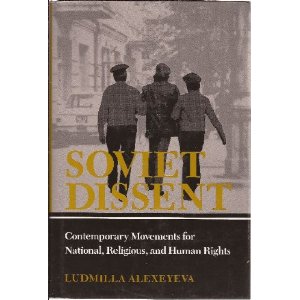 Democracy and human rights advocates are mourning the loss of Lyudmila M. Alexeyeva, a leader of the Russian human rights movement in the Soviet Union and in the era of President Vladimir V. Putin, [who] died on Saturday in a Moscow hospital. She was 91. Her death was confirmed to the Russian news media by Mikhail Fedotov, the director of the presidential human rights council, The New York Times reports:
Democracy and human rights advocates are mourning the loss of Lyudmila M. Alexeyeva, a leader of the Russian human rights movement in the Soviet Union and in the era of President Vladimir V. Putin, [who] died on Saturday in a Moscow hospital. She was 91. Her death was confirmed to the Russian news media by Mikhail Fedotov, the director of the presidential human rights council, The New York Times reports:
Ms. Alexeyeva had been Russia’s most prominent surviving Soviet-era dissident, harking from the same generation as the physicist Andrei Sakharov and the novelist Aleksandr Solzhenitsyn. Though frail, she took part in street protests until about eight years ago. She spent about 50 years in the Russian opposition, starting as a typist for a samizdat journal in the 1960s and continuing as an observer of politicized court hearings against street protesters under Mr. Putin.
Ms. Alexeyeva was a co-founder of the Moscow Helsinki Group, a pioneering human rights organization, for which the Soviet authorities exiled her from the country. She then served as the organization’s chairwoman after returning to Russia in the post-Soviet period.
 “She was clearly one of the giants,” Tanya Lokshina, an associate director for Europe and Central Asia at Human Rights Watch, said in a telephone interview. “She called herself the grandmother of the Russian human rights movement, and that is what she was.”
“She was clearly one of the giants,” Tanya Lokshina, an associate director for Europe and Central Asia at Human Rights Watch, said in a telephone interview. “She called herself the grandmother of the Russian human rights movement, and that is what she was.”
“Luda Alekseyeva was a gentle and humble person, yet also a very powerful and determined defender of basic human rights and democratic values,” said National Endowment for Democracy President Carl Gershman. “She played a profoundly important and pioneering role in creating the Moscow Helsinki Group in 1976 and in using the Helsinki process to raise the banner for human rights in the Soviet Union.”
A recipient of the National Endowment for Democracy’s 2004 Democracy Award, Alexeyeva (above, 4th from left) “represent[ed] a bridge between the two historical periods of Soviet dissent and the contemporary defense of human rights, and also between two generations or Russians fighting for democracy…. a revered symbol of a different Russia that is more tolerant and free,” said Gershman.
Alexeyeva trained as an archaeologist and in the late 1950s, her apartment became a meeting place for the Soviet dissident intelligentsia, and a point for storing and distributing banned publications, AFP notes:
 She campaigned against trials for dissidents, losing her job as a science publisher and enduring numerous searches and interrogations by the KGB. With her security under threat, she left the USSR in 1977 for the United States [where she wrote two books: “The Thaw Generation: Coming of Age in the Post-Stalin Era” and “Soviet Dissent: Contemporary Movements for National, Religious and Human Rights] Alexeyeva returned to Russia in 1993 after the Soviet Union collapsed, and became a strong critic of Putin.
She campaigned against trials for dissidents, losing her job as a science publisher and enduring numerous searches and interrogations by the KGB. With her security under threat, she left the USSR in 1977 for the United States [where she wrote two books: “The Thaw Generation: Coming of Age in the Post-Stalin Era” and “Soviet Dissent: Contemporary Movements for National, Religious and Human Rights] Alexeyeva returned to Russia in 1993 after the Soviet Union collapsed, and became a strong critic of Putin.
She returned to Russia in 1993 following the collapse of the Soviet Union to rebuild the Moscow Helsinki Group, optimistic that a new liberal order would prevail in her homeland, DW reports:
But the 1990s economic chaos and human rights abuses committed during Chechen wars, were then followed by a clampdown on civil society after Putin took over in 2000… Even in her 80s, Alexeyeva joined protests on Moscow’s Triumfalnaya Square in 2009-10 every 31st day of a month to defend the 31st article of the Russian constitution that guarantees freedom of assembly. One iconic image shows Alexeyeva being taken away by police on the last day of 2009.
“As bad as the human rights situation might be currently, it’s still better than during the Soviet era, when we had no rights at all. We may be lagging behind European states, but there have also been some positive changes,” she told DW in a 2016 interview.
Her views were also a critique of the vilification of Mr. Putin as personally responsible for rolling back Russian democracy and the idea, sometimes heard among his opponents, that if he were to step down Russia might be ruled differently. Only by building civil society could Russians achieve better results from their leaders, she maintained, The Times adds.
“She kept pushing that point,” Ms. Lokshina of Human Rights Watch said. “There could be different leaders, but if there is a healthy system of checks and balances, it is much more difficult to do serious damage. Unfortunately, in Russia, that is not the case.”
“I’m very proud that the NED honored her in 2004 with our Democracy Award,” the NED’s Gershman added. “No one has deserved it more. She was a monumental figure and also a very dear friend. We mourn her death and will do our best to carry forward the humane values that she cherished.”







